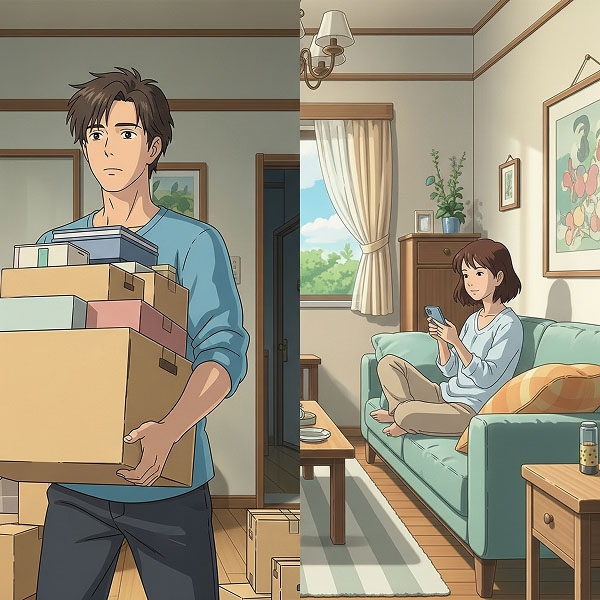Balancing Needs in a Healthy Relationship
In modern dating, there's a lot of advice about knowing your worth, putting yourself first and never settling. And yes, taking care of yourself is crucial. You should absolutely know your values, protect your peace and honor your emotional needs. But here’s something just as important:
Healthy relationships aren’t one-sided. They’re mutual.
Love isn’t just about getting your needs met, it’s also about learning how to give, compromise and grow with someone else. When relationships are only about one person’s needs, yours or theirs, they quickly become unbalanced, resentful or even toxic. We want to break down how to balance your needs and your partner’s in a healthy, mutual and emotionally safe relationship.
Why Mutual Care is the Foundation of Real Love

Think of a relationship like a partnership where both people are seen, valued and supported. If only one person’s needs are getting met, whether emotionally, physically or mentally, it stops feeling like a relationship and starts feeling like a transaction. In healthy love:
- You both feel safe to express your needs
- You both make compromises sometimes
- You both celebrate each other’s wins
- You both support each other through challenges
This doesn’t mean you always give 50/50 in every moment. Some days you may give more, some days they will. But overall, the emotional balance feels fair and respectful.
Self-Care: Not Selfish

There’s a difference between:
- Being self-aware vs. being self-absorbed
- Knowing your boundaries vs. refusing to grow
- Honoring your emotions vs. ignoring your partner’s
Self-care is about showing up as your healthiest self so that you can connect better with others. Not so you can build walls and call it “protection”.
Real maturity is learning how to meet your needs without dismissing your partner’s.
The Balance Equation In Relationships

| Me | + You | = Us |
|---|---|---|
| I matter. | You matter. | We matter. |
| I have needs. | You have needs. | We both deserve to be heard and met. |
| I bring my best self. | You bring your best self. | We grow stronger together. |
Here’s the truth:
- If you're only focused on your needs, you’ll miss opportunities for true connection.
- If you're only focused on their needs, you'll lose your identity and burn out.
A healthy We starts with two strong Me’s who are emotionally secure and willing to support each other. True love isn't just a feeling; it's a dynamic agreement, a continuous dance where both partners lead and follow with grace. For insights into cultivating this advanced level of mutual commitment and growth, where two individuals truly become one formidable team, explore the guide to Dating 101: Stage 5 - Partnership.
What Unbalanced Relationships Look Like
Here are signs that one side of the relationship is carrying too much of the load:
1. Over-giving or people-pleasing

- You always say yes, even when it hurts
- You feel guilty expressing your needs
- You feel like you’re walking on eggshells to keep the peace
Common thought:
“If I don’t do everything for them, they’ll leave.”
Why it’s unhealthy:
You’re ignoring your own needs in the name of “love.” That’s not love, that’s self-abandonment.
2. Being overly self-focused

- You dismiss your partner’s feelings because you “need to protect your peace”
- You avoid compromise by saying “this is just how I am”
- You expect your partner to meet all your needs, but don’t ask how to meet theirs
Common thought:
“If they really cared, they’d just accept me completely.”
Why it’s unhealthy:
Growth, not entitlement, is key to connection. Love requires effort on both sides.
What Balanced Relationships Feel Like

Here’s what mutual care looks like in action:
You both listen with curiosity, not just defensiveness
- You don’t have to agree on everything, but you try to understand
- You ask, “How can I support you right now?”
- You feel safe being honest, even when it’s uncomfortable
You both ask for what you need and make space for theirs
- You can say, “I feel hurt when…” without being blamed
- They can say, “I need more time alone” and you don’t take it personally
- You check in with each other regularly, not just during conflict
You both grow individually and together
- You support each other’s dreams
- You can say “no” without guilt
- You don’t just survive problems, you work through them as a team
5 Questions to Check: Balance in Your Relationship

Use these questions to reflect on your current or future relationship:
- Do I feel safe to express my needs, or do I hold back?
- Do I know what my partner needs or have I stopped asking?
- Do we talk about hard things, or sweep them under the rug?
- Are we making space for each other’s growth and boundaries?
- Do we feel like a team or like two people just trying to get our own way?
Relationships as a Loop: Not a Ladder

Ultimately, relationships are an ongoing Dating Feedback Loop of checking in, growing and resetting. To truly master the art of continuous improvement and healthy growth in your connections, explore how to harness this powerful cycle for yourself.
- Checking in with yourself
- Checking in with your partner
- Growing together
- Resetting when needed
Every time you loop back, whether it's after a fight, a life change or a moment of distance, you get a chance to reconnect and rebalance. Growth isn’t linear, and neither is love.
Real-Life Examples
Scenario 1: The Weekend Dilemma
- You need alone time to recharge.
- Your partner wants to spend the whole weekend together.
What you can say:
“I love being with you, but I also need a little solo time to reset. Can we do something Saturday night and I’ll use Sunday to recharge?”
Why it works:
You’re honoring both needs without making either person wrong.
Scenario 2: Emotional Support Check-In
- Your partner had a stressful day and needs to vent.
- You’re emotionally tired too.
What you can say:
“I want to hear about your day. Can I take 30 minutes to reset and then give you my full attention?”
Why it works:
You’re still showing up, but in a way that’s healthy for you too.
Bonus Tips: How to Practice Mutual Care Daily
Use “I feel” instead of “You never…”
Keeps things calm and focused on connection.
Ask your partner, “What helps you feel loved?”
Then share yours too.
Practice emotional check-ins weekly.
Try: “Is there anything we need to talk about?” or “How are we doing lately?”
Don’t keep score.
Give with a full heart, not as a trade. But do notice patterns.
🧭 Final Thoughts: Love is a Partnership, Not a Performance

At the end of the day, love is not about winning, fixing someone or always getting your way. It’s about building something that honors both people, your voice, your needs, your values, your dreams. When you both feel:
- Safe to speak
- Heard without judgment
- Loved even during hard moments
That’s when love starts to feel like home. So yes, take care of yourself. Know your worth. But don’t forget the other half of real connection:
Showing up for each other with honesty, kindness, and mutual care.
❓ Frequently Asked Questions
| 1. What does "Real Love, a Two-Way Street" mean? |
|---|
| It means that a healthy relationship requires both partners to give and take, balancing their own needs with their partner's needs. |
| 2. What is the foundation of real love? |
|---|
| Mutual care is the foundation, where both people feel seen, valued and supported. |
| 3. How is self-care different from being self-centered in a relationship? |
|---|
| Self-care is about meeting your own needs, while being self-centered means focusing only on yourself and ignoring your partner's needs. |
| 4. What is the "Balance Equation"? |
|---|
| The equation is "Me + You = Us," meaning two strong individuals create a healthy partnership. |
| 5. What are some signs of an unbalanced relationship? |
|---|
| Signs include one person always giving too much or one person being too focused on themselves without considering their partner. |
| 6. How can you tell if a relationship is balanced? |
|---|
| In a balanced relationship, both partners actively listen, ask for their needs and grow together. |
| 7. What is the most important thing to remember about true love? |
|---|
| Love is a partnership built on honesty, kindness and mutual care, where both individuals feel safe, heard and loved. |
Table of content
- Balancing Needs in a Healthy Relationship
- Why Mutual Care is the Foundation of Real Love
- Self-Care: Not Selfish
- The Balance Equation In Relationships
- What Unbalanced Relationships Look Like
- What Balanced Relationships Feel Like
- 5 Questions to Check: Balance in Your Relationship
- Relationships as a Loop: Not a Ladder
- Real-Life Examples
- Bonus Tips: How to Practice Mutual Care Daily
- 🧭 Final Thoughts: Love is a Partnership, Not a Performance
- ❓ Frequently Asked Questions
